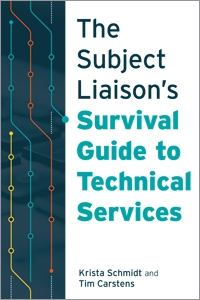Primary tabs
You don't need to be an ALA Member to purchase from the ALA Store, but you'll be asked to create an online account/profile during the checkout to proceed. This Web Account is for both Members and non-Members.
If you are Tax-Exempt, please verify that your account is currently set up as exempt before placing your order, as our new fulfillment center will need current documentation. Learn how to verify here.
- Description
- Table of Contents
- About the authors
- Reviews
Subject liaisons act as a bridge connecting academic departments to the library and its services, helping facilitate instruction sessions, research support, and collection development. To be at their best in these roles, subject liaisons need a working understanding of technical services functions. This book represents the first guide to speak directly to the needs and responsibilities of subject liaisons, clearing away unnecessary information and jargon to bring them up to speed on how technical services staff get things done. Clear and concise, this guide
- covers policy, budgets and funding, submitting orders, acquisitions ordering, processing, cataloging, deselection and weeding, and other major technical services duties;
- includes appropriate background information on each topic to enhance readers' understanding;
- provides "Questions You Should Be Asking" connected to each chapter which encourage subject liaisons to be proactive in their learning; and
- offers a glossary of common technical services terms.
Armed with this guide's targeted information, subject liaisons will be able to better position themselves to serve both instructors and the library effectively.
Acknowledgments
Introduction
Chapter 1 Collection Development
Structure
Communication
Policy
Data and Information
Chapter 2 Budgets and Budgeting
Understanding Your Institution's and Library's Financial Picture
- Sources of Funds
- Decision Making
Allocating Funds within the Library
Communication and Timing
Chapter 3 Submitting Orders
Organizational Structure
Information and Processes
Timing Is Everything
Chapter 4 Acquisitions Ordering
Organizational Structure (Again)
Record Keeping and Communication
Ordering Processes
Timing Is Everything (Again)
Chapter 5 Receiving and Processing
Receiving and Processing Physical Resources
- Books, Media, and Other Non-serial Items
- Serials
- Collection Designation
Receiving and Processing Electronic Materials
- E-books
- Databases and E-journals
Chapter 6 Cataloging
Copy and Original Cataloging
Enhancing Cataloging Records
- Individual Record Editing
- Batch Editing
- Workflow Edits
Enhancing the Catalog Itself
Chapter 7 Collection Maintenance
Weeding
- Initiation and Planning
- Decision Making
- Withdrawal Processes
Location Changes
Format Updates
Glossary
Bibliography
Index
Krista Schmidt
Krista Schmidt has worked in libraries for 15 years and was the first dedicated subject liaison hired by Hunter Library at Western Carolina University (WCU). She currently serves as the STEM liaison and maps librarian at WCU and has spent six years on the university library’s collections advisory committee. She was named a 2013 Mover & Shaker by Library Journal.
Tim Carstens
Tim Carstens was a monographic cataloger at North Carolina State University from 1984 until 1990, when he began working for Western Carolina University in Cullowhee, North Carolina. He has served as head of the Cataloging and Acquisitions Unit and the Content Organization and Management Department, and his responsibilities have included collection development, acquisitions, cataloging and metadata, serials, and electronic resources. He was appointed associate dean of Library Services at Hunter Library in 2014 before retiring in 2016.
”It is critical that reference librarians have a working knowledge of technical services processes. This slim volume does an excellent job of exploring that information in terms a reference librarian can understand ... Libraries should not buy a copy or two for professional bookshelves. Those that wish to empower their subject liaisons should buy a copy for each one of them, so they can make notes on the pages and keep it on their desks."
— Technicalities
”Quite comprehensive … Recommended, primarily suited for academic libraries or very large public libraries."
— Catholic Library World
”This compact guide is accessible in both language and format and fills a gap in professional literature.”
— VOYA
”An informative guide ... Recommended for academic and research librarians."
— Library Journal



